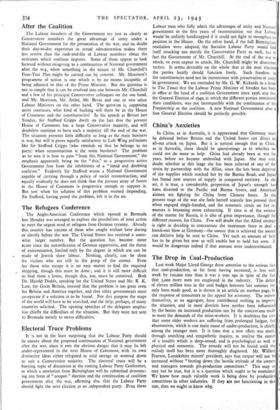After the Coalition
The Labour members of the Government see just as clearly as Conservative members the great advantage of unity under a National Government for the prosecution of the war, and no doubt their day-to-day experience in actual administration makes them less restive than the rank-and-file of Labour members about the restraints which coalition imposes. Some of them appear to look forward without misgiving to a continuation of National government after the %W V, when something in the nature of Mr. Churchill's Four-Year Plan might be carried out by consent. Mr. Morrison's programme of action is one which is by no means incapable of being adjusted to that of the Prime Minister. But the question is not so simple that it can be resolved into one between Mr. Churchill and a few of his principal Conservative colleagues on the one hand, and Mr. Morrison, Mr. Attlee, Mr. Bevin and one or two other Labour Ministers on the other hand. The question is, supposing unity continues, what kind of backing will there be in the House of Commons and the constituencies? In his speech at Bristol last Sunday, Sir Stafford Cripps dwelt on the fact that the present House of Commons has a large Conservative majority, and will doubtless continue to have such a majority till the end of the war. The situation presents little difficulty so long as the main business is war, but will it prove equally satisfactory to Left Wing politicians like Sir Stafford Cripps (who reminds us that he belongs to no party) when reconstruction is the main business? The problem as he sees it is how to pass " from this National Government," the emphasis apparently being on the " this," to a progressive active Government free from the inhibitions of a " timid and doubting coalit'on." Evidently Sir Stafford wants a National Government capable of carrying through a policy of social reconstruction, and equally evidently he does not think that the present array of forces in the House of Commons is progressive enough to support it. But just when his solution of this problem seemed impending, Sir Stafford, having posed the problem, left it in the air.


























 Previous page
Previous page